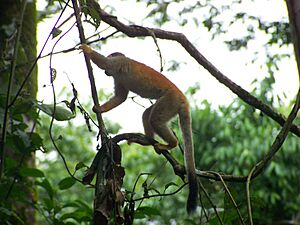Grey-crowned Central American squirrel monkey facts for kids
Quick facts for kids Grey-crowned Central American squirrel monkey |
|
|---|---|
 |
|
| Conservation status | |
| Scientific classification |
|
| Kingdom: | Animalia |
| Phylum: | Chordata |
| Class: | Mammalia |
| Order: | Primates |
| Suborder: | Haplorhini |
| Infraorder: | Simiiformes |
| Family: | Cebidae |
| Genus: | Saimiri |
| Species: | |
| Subspecies: |
S. o. citrinellus
|
| Trinomial name | |
| Saimiri oerstedii citrinellus Thomas, 1904
|
|
| S. o. citrinellus range shown in red | |
The grey-crowned Central American squirrel monkey (Saimiri oerstedii citrinellus) is a special kind of Central American squirrel monkey. You can find it only along the Pacific coast in central Costa Rica. Its home stretches from the Rio Tulin in the north to the Rio Grande de Terraba in the south. South of the Rio Grande de Terraba, you'll find a different type, the black-crowned Central American squirrel monkey. These monkeys live in small, separate groups. You can often spot them in Manuel Antonio National Park in Costa Rica.
What Does It Look Like?
This squirrel monkey has bright orange or reddish-orange fur. It also has a black cap on its head. Its arms and belly are not as yellow as its close relative, the black-crowned Central American squirrel monkey. Some experts say its cap is less black, but others think this changes as the monkey gets older.
Adult monkeys are about 26 to 29 centimeters (10 to 11 inches) long, not counting their tail. They weigh between 600 and 950 grams (about 1.3 to 2.1 pounds). Their tail is even longer than their body, measuring about 36 to 39 centimeters (14 to 15 inches). Male monkeys are usually a bit heavier, weighing around 829 grams (1.8 pounds). Females weigh about 695 grams (1.5 pounds).
Daily Life and Diet
The grey-crowned Central American squirrel monkey spends its life in trees. It is also diurnal, meaning it is active during the day. These monkeys live in groups that include several adult males, many adult females, and young monkeys.
They are omnivores, which means they eat both plants and animals. Their diet includes insects like grasshoppers and caterpillars, and spiders. They also enjoy fruits, leaves, bark, flowers, and nectar. Sometimes, they eat small vertebrates such as bats, birds, lizards, and frogs. They find their food by searching through the lower and middle parts of the forest.
Why Are They Endangered?
The International Union for Conservation of Nature (IUCN) lists the grey-crowned Central American squirrel monkey as Endangered. This is an improvement from before, when it was listed as "critically endangered." It is endangered because it lives in a small and broken-up area. This area is only about 3,500 square kilometers (1,350 square miles). Their habitat is still shrinking, which means they are losing their homes. People in Costa Rica are working hard to protect these monkeys from disappearing forever.


